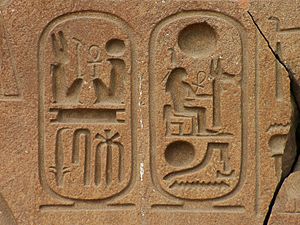Name facts for kids
A name is a word or a group of words. We use names to identify things and people. For example, "cat" is the name of an animal. "Ryan" is a common name for a boy. "Julia" is a common name for a girl.
The word 'name' can also be a verb. To name something means to give it a name. For instance, you might name your new pet.
How People Get Their Names
In many cultures, there are special rules and customs about how people get their names. Some of these rules are set by laws. Others are based on traditions. Traditions are ways of doing things that have been followed for a long time.
These rules cover different parts of names and how they are given.
How Many Parts Does a Name Have?
Some cultures use a single-part name. An example might be "ShiningWater."
Other cultures use a two-part name. "John Smith" is an example of this.
In some places, a person can have many parts to their name. In the United States, some people have three parts: a first name, a middle name, and a last name. Others might have just two: a first and a last name.
In Chinese cultures, names often have three parts. For example, "Cheah Ching San." Here, "Cheah" is the family name. When written in English, it might be "Ching San, Cheah."
Family Names and Relatives
In many cultures, people share the same "family name" (or surname) as their parents. For example, if John Smith's father is Mike Smith, and Mike Smith's father is James Smith, they all share the "Smith" family name.
In other cultures, a person might have their father's name as part of their own name. But it might be in a different spot. For instance, Shafiq Hanif's son might be Hanif Kamal. "Hanif" is in both the father's and son's names.
When Names Change
In some cultures, a person's name can change. This might happen when they marry or divorce. It can also change after some religious ceremonies.
For example, in some Spanish-speaking countries, people use two last names. These are usually their mother's father's name and their father's name. If Elena Rodriguez Gomez marries Jose Sanchez Soria, she might change her name to Elena Rodriguez de Sanchez. Their child could then be named Pilar Sanchez Rodriguez. This child would take names from both of their grandfathers.
Where Do Names Come From?
Many personal names come from history. In most European countries, some first names come from the Bible. In other cultures, names are taken from a relative.
Sometimes, a name shows what parents hope their child will be like. A baby might be named Wisdom because the parents wish for a wise girl or boy.
Some cultures avoid animal names for people. For example, you won't find names like Dog, Cat, or Owl among Japanese first names. But in some other cultures, animal names can be seen as good.
How Names Sound and Look
In some languages, you can tell if a word is a person's name just by its spelling or how it sounds. There are often special patterns. For example, many Chinese names have three syllables.
Using Names and Nicknames
In some cultures, people use full names when they talk to each other. In other cultures, people use nicknames. Sometimes, people use titles like "father" or "professor" instead of names.
Examples of Names
Here are some common examples of names: Sarah, Lucy, Ellen, Claire, Ben.
Names can also be shortened. For example, Isabelle can become Izzy or Belle.
Japanese Names
Here are some common things about Japanese names today. Rules were different in the past.
Parts of a Japanese Name
Japanese names usually have two parts. One is the family name, and the other is the given name.
"Suzuki Ichiro" is a Japanese person's name. "Suzuki" is the family name, and "Ichiro" is the first name. In the Japanese language, the family name comes first. It's like saying "Smith John" instead of "John Smith."
Only members of the royal family in Japan do not have a family name.
Family Names in Japan
A newborn baby gets their family name from their parents. The parents usually have the same family name. So, if Ono Yoko (female) and Ono Ken (male) have a son, his name would be Ono something.
The family name "Ono" is usually passed down through the male side of the family. So, Ono Ken's parents would have the family name Ono. But Ono Yoko's parents probably would not.
Name Changes in Japan
People's names in Japan can change when they marry or divorce. It's a common custom around the world for women to take their husband's family name when they marry. However, in Europe and North America, many women now choose not to do this. Sometimes, the man might even take the woman's family name.
See also
 In Spanish: Nombre para niños
In Spanish: Nombre para niños
Images for kids
-
A signature is a person's own handwritten name
 | John T. Biggers |
 | Thomas Blackshear |
 | Mark Bradford |
 | Beverly Buchanan |




